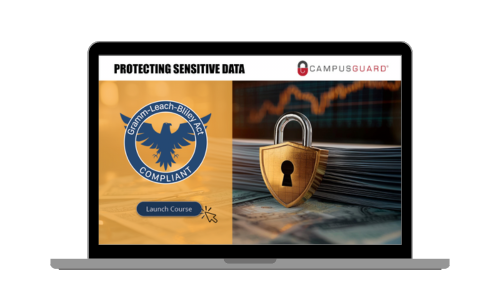GLBA Training Course
Safeguard sensitive financial information to reduce risk exposure and uphold GLBA compliance standards
GLBA Course Description
This course provides an overview of the Gramm-Leach-Bliley Act (GLBA) and its application within higher education, discusses increasing information security risks, and strategies for protecting sensitive data, penalties for non-compliance, and the possible consequences of a data breach.
- Target Audience: All staff interacting with covered customer financial data
- Course Length: 25 minutes
GLBA Course Learning Objectives
This training course covers the GLBA Privacy Rule, the Safeguards Rule, and the Pretexting Rule, the required administrative, technical, and physical controls that must be implemented, necessary third-party oversight, and steps to achieve compliance.
Understand how GLBA applies to your organization. Discover best practices for securing and accessing sensitive financial information, how to ensure compliance, and prevent unauthorized access to data.

GLBA Awareness Course Modules
Our GLBA course is designed with micro-learning modules, making the content easier to retain.
-
Protecting Sensitive Data
This module provides an overview of GLBA and its application within higher education, discusses increasing information security risks, and strategies for protecting sensitive data, penalties for non-compliance, and the possible consequences of a data breach. -
Privacy and Safeguards Rule
This module covers both the GLBA Privacy Rule and the Safeguards Rule, the required administrative, technical, and physical controls that must be implemented, necessary third-party oversight, and steps to achieve compliance. -
BONUS MODULE: Federal Tax Information (FTI)
With FTI now provided directly from the IRS for purposes of administering federal aid programs, specifically for use in the Free Application for Federal Student Aid (FAFSA) form, customers need to ensure financial aid staff understand new requirements, restrictions on FTI data use, and best practices for protecting this sensitive data. This supplemental training module guides you through common scenarios and frequently asked questions related to FTI.
 Explore our other courses
Explore our other courses
Explore our full course library to find training that fits your needs, from security awareness and compliance essentials to specialized topics designed to support your role and responsibilities. Whether you’re looking to strengthen your cybersecurity posture, stay up to date with industry regulations, or broaden your knowledge, we’ve got you covered.
The Latest GLBA Course Updates
- Overview of Pretexting Rule
- Insider Threat Prevention
- Third-Party Oversight
- Incident Management and Reporting Requirements
- Common technical failures, including endpoint management
- Penalties for non-compliance
- Updated data breach statistics
- Implications and common scenarios in Higher Education
- Updated graphics
Access Our Resource Library and Threat Intel News
All GLBA Awareness Course users also have access to our Resource Library, which offers supplemental materials that support the course content.
Our Threat Intel Briefing newsletter is sent directly to your inbox twice a month, and features the latest cyber threats, cyber crimes, and vulnerabilities happening now around the globe.

Related Products and Services
GLBA Videos and Articles
Three Pillars of the GLBA: Financial Privacy Rule, Safeguards Rule, and Pretexting Protection
In this video, we explore the three pillars of The Gramm-Leach-Bliley Act (GLBA). Among the central components of GLBA compliance are the Financial Privacy Rule, the Safeguards Rule, and Pretexting Protection.
These three pillars are designed to create a comprehensive framework that governs how financial institutions manage and protect consumer information.
GLBA Compliance FAQs
In this video, CampusGuard discusses the GLBA and your most frequently asked questions (FAQs). We’ll discuss the basics of GLBA, the requirements, GLBA compliance and risk assessments, preparing for a GLBA audit, and other common questions related to GLBA compliance.
Preparing for a GLBA Audit
For a successful GLBA audit, your organization can enhance its preparation by focusing on a few crucial areas. Watch the video to learn what steps your organization needs to take to achieve and maintain GLBA compliance.
West Virginia University Achieves GLBA Compliance Partnering with CampusGuard
Learn how CampusGuard’s remediation strategies enabled WVU to make decisions about security-related initiatives to accept, reduce, or eliminate risks. They also support longterm strategic risk management activities to ensure the protection of NPI.
What Is the GLBA?
Learn what the Gramm-Leach-Bliley Act (GLBA) is, who it applies to, the different rules that make up the GLBA, penalties for non-compliance, and how an assessment will benefit your team by analyzing your areas of risk, impact of third-party services, and more.
Avoid These 8 Common GLBA Violations
Read our list of common GLBA violations, which involve failures to adequately protect consumer information, and how to avoid them.
Updates to the GLBA Safeguards Rule
The GLBA Safeguards Rule requires financial institutions to establish a comprehensive information security program tailored to their size, complexity, and activities in order to ensure the confidentiality and integrity of the customer data they use and store.
The latest updates to the Safeguards Rule outline more prescriptive requirements, potentially affecting GLBA programs that were previously considered compliant.
"When I first became a CIO, the compliance rules related to PCI and GLBA were enough to make my head spin. Thanks to CampusGuard, not only was I able to understand the requirements but they were extremely helpful in improving our processes so that we remained in compliance. The training they provide is so very thorough and has helped to improve our division's understanding of these important regulations."
Protecting Sensitive Financial Data
CampusGuard’s GLBA training course equips your staff with practical strategies for securing sensitive data and outlines clear steps to prevent unauthorized access.
GLBA Training Frequently Asked Questions
- Banks and credit unions
- Securities firms, including broker-dealers, investment companies, and investment advisors
- Insurance companies, including life, health, and property and casualty insurers
- Mortgage brokers, loan servicers, and other non-bank lenders
- Financial service providers, including check-cashing and money-transmission businesses
- Any other entity that provides financial products or services to consumer




